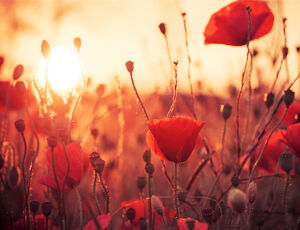University News Last updated 30 January 2015

August 2014 marked 100 years since the outbreak of the First World War. Helen Eden looks at the profound impact the conflict had on English poetry and how it still resonates today.
War has always inspired poetry. As far back as Homer’s 'Iliad', poets have immortalised warriors as heroes, the shapers of nations and defenders of just and worthy causes. Right through to the Victorian era, poems like Lord Tennyson’s 'The Charge of the Light Brigade' depicted going to war as a noble act. However, with the horrors of the First World War came a new kind of writing that expressed suffering, tragedy and despair in poems such as Wilfred Owen’s 'Dulce et Decorum Est'.
Dr Gregory Leadbetter, Director of our Institute of Creative and Critical Writing, explains: “World War One changed the poetic tradition. Before then, we didn’t really have war poetry in the modern sense.
“It’s the moment where the whole of that tradition of honourable death in the name of one’s country is transformed, if not wholly rejected.
“Essentially, all of these poets were showing people things that maybe they didn’t want to see, but once they did see, they could empathise with.”
In an era when we are surrounded by vivid photography and television footage of conflict all around the world, it is perhaps difficult for us to understand the profound impact of this new kind of poetry in 1914. War had been something which happened in a distant place in pursuit of lofty ideals, but suddenly civilians were given a glimpse of the mud and the blood through a soldier’s own eyes.
“Imaginative writing prevents our ideas from being purely abstract,” says Dr Leadbetter. “The act of imaginative empathy, of which the World War One poets were such masters, is what humanises the complexity of our experience. It’s a way of coming to terms with something that’s really very difficult to articulate.”
By writing about their experiences, the First World War poets played an important role in keeping history alive. Their vivid writing continues to capture the artistic imagination today, including here at the University.
Drawing on the works of the First World War poets, BA (Hons) Theatre, Performance and Event Design students created a poignant ‘paper soldiers’ installation in The Parkside Building earlier this year. Using the Battle of the Somme as the setting, the exhibition was made up of paper and cardboard, and sets included life-size trenches, poor outdoor sleeping quarters and injured soldiers.
The University is also involved in Voices of War and Peace: the Great War and its Legacy, a new First World War Engagement Centre based in the Library of Birmingham. Led by the University of Birmingham, it is a joint initiative with Birmingham City University, Newman University, the University of Wolverhampton and the University of Worcester, as well as the University of Glasgow, Manchester Metropolitan University and Cardiff University.
Voices of War and Peace launched in March 2014 and it is funded for three years by the Arts & Humanities Research Council in partnership with the Heritage Lottery Fund. It will support a variety of community engagement activities, offering research support and guidance for community groups as well as providing a focus for relevant academic research.
Visit Voices of War and Peace project for more information.